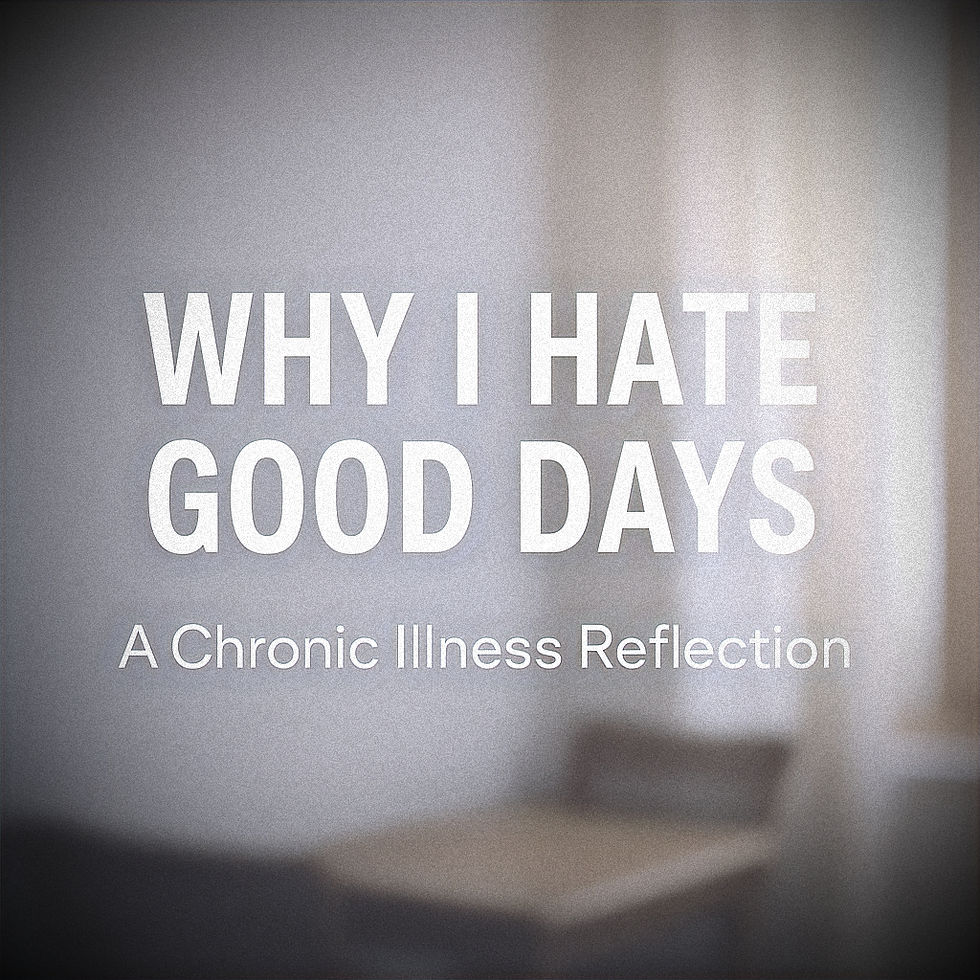The Problem with Chronic: Waking up Sick. Every day.
- Genevieve Hawtree
- Jun 3, 2025
- 3 min read

Imagine This...
You wake up in the morning feeling hot… then cold… then hot again. Your brain is fuzzy. Your head aches. Your whole body feels heavy,and sore in a way that’s hard to describe.
Still, you get up and try to start your day. But it feels like you’re walking through molasses. Your thoughts are slow. Your body is slower. And all you want is to go back to bed.
Most of us have felt that way at some point - usually at the beginning of a cold or the flu. On days like that, people usually call in sick. Cancel plans. Stay home and rest.
Now Imagine That Feeling Never Goes Away
Sure, some days might be a little better - less sore, less foggy, more functional. But other days? Way worse.
And yet, society and everyone around you still expects you to keep going. You look fine after all.
You’re still supposed to:
Get up
Shower
Exercise
Show up at work
Run errands
Meet friends
Make dinner
Clean the house
And do a million other little things that life asks of us.
And if you’re chronically ill? You can add doctor’s appointments, specialist visits, maybe physiotherapy, acupuncture, or whatever’s part of your care plan—on top of all of that.
But how?
Most people would cancel everything if they felt like this for a day or two. Now imagine feeling like this every single day - and still being expected to act like everything’s fine.
Chronic Means Always
For a lot of us with chronic illness, this is just life. There is no bouncing back. There is no getting better. We won’t wake up tomorrow feeling like our old selves again. We’re always managing pain, exhaustion, brain fog, or a mix of all three and a whole bunch of other symptoms too.
And here’s the thing: When we push through anyway - because we feel guilty, or because people expect us to, or because we are just sick of being sick - we don’t just get tired. We crash. We burn out. Our symptoms flare. A crash can mean hours, days, or even weeks of feeling worse - sometimes much worse.
What causes a crash? It’s different for everyone. Part of learning to live with chronic illness is figuring out your own limits - and what pushes you past them.
A Glimpse Into My Morning
This morning, I woke up with a migraine - my third this week. My head felt like it was stuffed with cotton. My vision was blurry. My whole body ached, itched, and burned. I slept for eight hours, but it felt like I hadn’t slept at all.
Eight years ago, a morning like this would have meant calling in sick and crawling back into bed. But now? This is my baseline. It’s always there - but some days are worse than others.
So I got up. I made coffee. I sat down to write this.
And even now, as I type these words, my headache is getting worse. My focus is slipping. My hands hurt. My fingers are trembling slightly. I’m making more typos than usual.
I can feel myself sliding into a flare—the warning signs are all there. If I don’t stop soon, I’ll crash. Writing this post matters to me, but it’s already taking a toll. And I’ve learned the hard way: pushing through just means I’ll lose more time to recovery.
I have to rest - because if I don’t, there will be consequences, and I’ve learned I don’t want to live with those. That’s why I pace myself. That’s why people with chronic illness have to get good at listening to their bodies and learning when to say no. It’s not selfish. It’s survival. It’s necessary. I’ll rest because I have no choice. And when I wake up tomorrow, I’ll still be sick. That’s the problem with chronic.










Comments